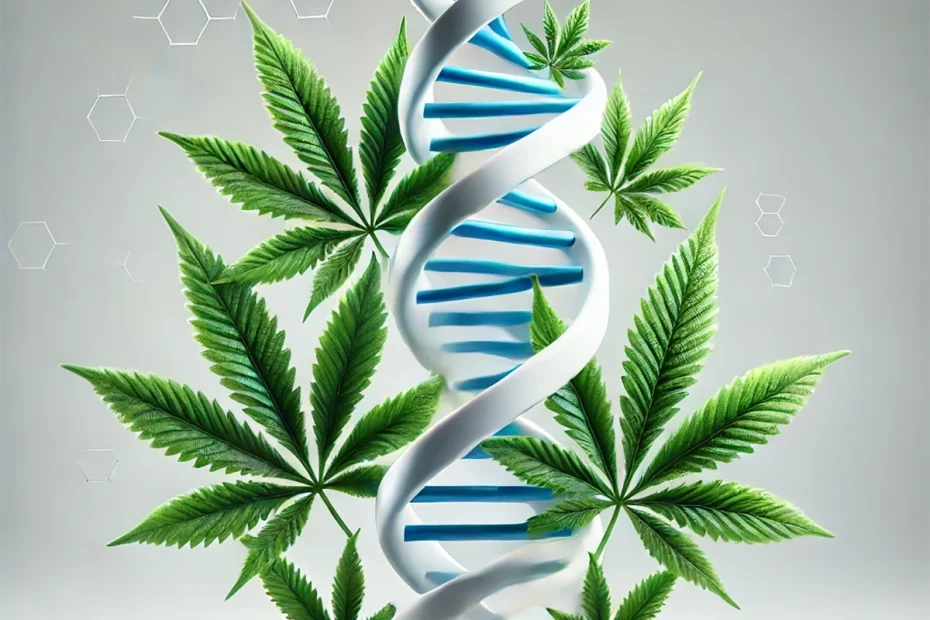Cannabis is currently the most popular drug in the world but, we don’t know a whole lot about how it acts on the brain and body! Some of the more perplexing reasons why cannabis sometimes induces psychosis in some users has just been researched. New work in Molecular Psychiatry has uncovered just how powerful cannabis can leave a unique fingerprint on DNA and opens the possibility of new information about the biological implications of marijuana.
The Rising Potency of Cannabis
The percentage of THC (Delta-9-tetrahydrocannabinol) in marijuana has grown greatly the past few decades. It has increased rapidly in the US and UK especially since the 1990s. THC is the main reason why cannabis users get “high” and aside from CBD, makes up the majority of the “goodies”. As high as 90% THC can be present in legal shops in states such as Colorado. THC is one of many chemicals in the cannabis plant, but it’s the one that most agree determines the strength of the plant.
Cannabis is becoming more potent and that’s great for most. Research has shown that users of cannabis containing more than 10% THC every day are five times more likely to develop a psychotic disorder than non-users. As psychotic diseases induced by high-THC cannabis can also involve sounds of hallucinations, paranoia and delusions that can be traumatic and crippling. This may remind some of you of old scare tactics like “Reefer Madness” (enjoy!) and we assure you, that’s not the goal. We just present findings as they are and with any substance, there may always be the odd case, even if rare.

Understanding DNA Methylation
This new research aimed to see how smoking cannabis – particularly high-potency strains – alters DNA via an activity called DNA methylation. DNA methylation is an epigenetic process that alters the activity of genes but not the sequence of DNA itself. It basically controls what genes are turned on and off, a sort of intermediary between environmental conditions (such as smoking marijuana) and gene activity.
DNA methylation belongs to a larger biology known as epigenetics, which regulates the impact of lifestyle and environment on our bodies and minds. It’s how, for example, cannabis use, food and exercise have a impact on how our genes behave.
The Research: Smoking Marijuana and the Genetic Adaptations
For the purpose of investigating the association between strong THC use and DNA methylation, the team compared results from two large-scale studies: the Genetic and Psychosis Study (in South London) and the EU-GEI Study (involving people in England, France, the Netherlands, Italy, Spain and Brazil). All these studies gathered data about those in the first psychotic crisis, and on healthy people without mental illness.
They enrolled 239 psychotic patients and 443 healthy volunteers aged between 16 and 72 (65% male). Participants reported details of their weed consumption and blood for DNA testing. Almost three-quarters of respondents said they use more than once a week, and most started when they were about 16, and they smoked high-potency cannabis.
They calculated DNA methylation for the entire genome and controlled for biological and environmental factors, including age, gender, ethnicity, smoking and the structure of blood samples for accuracy.
Psychosis and Unique DNA Signatures
They found that users who experienced psychosis had distinct DNA methylation patterns compared to those who had not. These mutations were most pronounced in genes for energy metabolism and immune system. Crucially, these DNA mutations did not occur because of smoking tobacco (though most cannabis users add tobacco to their joints, which alters DNA methylation).
It indicates epigenetic alterations to be a potential connection between cannabis and psychosis. Analyzing these DNA changes may also help scientists to explain why some people are prone to cannabis’ negative effects (including psychosis) and others aren’t.
Implications for the Future
What’s evident in this study is that we still need to learn more about the molecular effects of marijuana on the body. With further research, new avenues of detection can be created for those at high risk of psychosis. These DNA methylation patterns might one day be probed to see if they can be used as biomarkers to flag users at risk and potentially lead to targeted prevention.
These results show why if you’re using or contemplating cannabis, knowing the risks is important. Cannabis might be medically beneficial for some, such as for insomnia or stress relief, but with the increasing strength of products comes increased health hazards that should not be ignored, even if uncommon.
Finding Balance in Cannabis Use
Cannabis has become increasingly potent, so users need to know their options when they smoke it. High potency weed might be euphoric, but some users may be more susceptible to side-effects, such as psychosis. The consumer can better decide what is worth taking if he/she knows that cannabis can affect DNA and gene expression.
Cannabis is not a one-size-fits-all substance and the impact can be profound depending on personal characteristics, mental illness and usage patterns. The research also brings a final piece of the puzzle by demonstrating how high potency cannabis could cause long-term physiological transformations. Moderation and caution is the way to go, just like any other chemical we take whether medicinally or recreationally. This is true for almost everything we consume. Finding a happy balance is key.
Conclusion
The recent study of high-level cannabis and its DNA damage is just one step towards a more general picture of what’s happening to DNA in general. We’re only beginning to uncover the biological effects of cannabis, so users have to be educated and take informed health decisions. This epigenetics research could one day lead to improved prevention technologies, which could find those at highest risk and encourage safer use.
Here at CBD And THC Info, we aim to present facts as they are found which will unfortunately mean: negative facts at times. These side-effects appear quite rare and we’re not trying to deter anyone from enjoying their favorite bud. Just – like everything else – be responsible please and, use reputable shops.
Do you experience any negative side-effects from strong marijuana or a lot of THC? If you’re open to it, feel free to discuss below.
